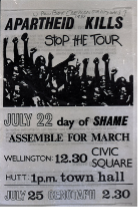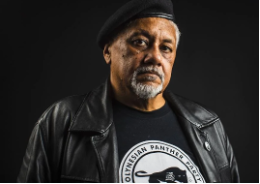The University of Auckland in New Zealand was founded in 1883 as Auckland University College, initially serving as a constituent college of the University of New Zealand. Its humble beginnings were in a disused courthouse and jail, where it started with 95 students and 4 teaching staff. Regretfully amongst these early educators, there was not a historian(1). Even today Auckland University does not have a “History Department” though it does have ‘study options’ for history(2) and the current (2023) situation of ‘segregated study areas’(3) provides ample opportunity for a history lesson, a whole thesis. We don’t have to go back too far in New Zealand history.
The 1981 Springbok rugby tour of New Zealand was a pivotal moment in the country’s history, sparking intense debates, protests, and social divisions as many citizens demonstrated resistance to a country with apartheid policies.


(Authors note: the second picture is from Auckland Universities’ own records regarding an exhibition concerning the tour and the issues involved. https://www.news.library.auckland.ac.nz/2021/08/06/winter-of-discontent-1981-springbok-tour/ )
The Springboks, South Africa’s national rugby team, were scheduled to tour New Zealand in 1981. At the time, South Africa was under the oppressive system of apartheid, which enforced racial segregation and discrimination. (Is this ringing a bell so far?) The tour became a flashpoint for discussions about racism, human rights, and sports diplomacy. Anti-apartheid activists, students and concerned citizens rallied against the tour. The “Stop the Tour” movement gained momentum, with protesters advocating for the cancellation of the Springboks’ visit. Demonstrations, marches, and clashes with police became common during the tour.
In a recent article by Stuff Magazine they remembered the tour in an article titled 1981 “Springbok tour 40 years on: ‘1981 was the battle for the soul of New Zealand'”(4). Credit where credit is due, Stuff and one of the people it interviewed were prescient as to how apartheid was a danger to New Zealand and could develop.


(Authors note: the second picture is from Auckland Universities’ own records regarding an exhibition concerning the tour and the issues involved. https://www.news.library.auckland.ac.nz/2021/08/06/winter-of-discontent-1981-springbok-tour/ )
The Springboks, South Africa’s national rugby team, were scheduled to tour New Zealand in 1981. At the time, South Africa was under the oppressive system of apartheid, which enforced racial segregation and discrimination. (Is this ringing a bell so far?) The tour became a flashpoint for discussions about racism, human rights, and sports diplomacy. Anti-apartheid activists, students and concerned citizens rallied against the tour. The “Stop the Tour” movement gained momentum, with protesters advocating for the cancellation of the Springboks’ visit. Demonstrations, marches, and clashes with police became common during the tour.
In a recent article by Stuff Magazine they remembered the tour in an article titled 1981 “Springbok tour 40 years on: ‘1981 was the battle for the soul of New Zealand'”(4). Credit where credit is due, Stuff and one of the people it interviewed were prescient as to how apartheid was a danger to New Zealand and could develop.
“After what we had seen in New Zealand, we could see [apartheid] coming here,” says Polynesian Panther Tigilau Ness.


Apparently, they were and are correct.
I’d like to know exactly how this works (and will continue) for the following people:
- The (non-Maori or non-Pasifika) spouses of privileged groups.
- Those that are of mixed blood.
- Those that identify as a privileged group.
- In situations of scarce resources, e.g. you need to use a computer, but it is only available on “hallowed” or “tapu” ground; are you left without?


By the early 1980s when New Zealanders came out to protest apartheid, we had come a long way toward better managing race relations, e.g. the Waitangi Tribunal (established in 1975)(6). Now we have a rehabilitation of racism under a different guise and dissension is being sown, particularly in our schools and universities amongst our young and impressionable. (Note that I find it particularly noxious that many of those same people who protested in 1981 are now promoting these ideas of segregation. For those not promoting this new racism – where are your protestations now?)
Recently, I wrote an article about the RBNZ and how it aims to develop a “DEI Centre of Excellence”, and it is not alone; all over New Zealand there are government departments and hundreds of businesses adopting these ideas, putting them into policy or even putting them into practice. Soon there will be hundreds of “segregated places”.
Make no mistake that the messages these places send are both intentional and designed to reinforce an ideology and stir disgruntlement. This needs to stop.
A solution is funding cuts to universities and departments that support this hateful ideology of “Woke”, that dishonestly presents itself as ‘caring and nurturing’ under the banner of “diversity, equity and inclusion” whereas, as we can see, with Auckland University being a prime example, it results in racist exclusion and segregation.
Additionally, there may be a legal solution as according to the New Zealand Human Rights Act 1993 Section 21(1), it is unlawful for an educational establishment, or the authority responsible for the control of an educational establishment, or any person concerned in the management of an educational establishment or in teaching at an educational establishment:
- To refuse or fail to admit a person as a pupil or student; or
- To refuse any other person the use of any facilities in that place or vehicle which are available to members of the public.
Therefore, even in the context of a university, discrimination based on race is prohibited, i.e. universities must not deny admission or access to facilities based on a person’s racial or ethnic background.
Maybe a lawsuit would introduce “Equity” into this situation.
References
Maybe a lawsuit would introduce “Equity” into this situation.
References
1 https://en.wikipedia.org/wiki/University_of_Auckland
2 https://www.auckland.ac.nz/en/study/study-options/find-a-study-option/history.html
3 https://www.nzherald.co.nz/nz/university-of-auckland-student-shuts-down-segregation-allegations-levelled-by-act-party/NDOIZJDBHBFHFOEJJYYHLUNLLI/
4 https://www.stuff.co.nz/pou-tiaki/125636133/1981-springbok-tour-40-years-on-1981-was-the-battle-for-the-soul-of-new-zealand
5 https://shoppeblack.us/harvard-black-graduation/
6 https://www.waitangitribunal.govt.nz/about/past-present-future-of-waitangi-tribunal/
Dr Michael John Schmidt left NZ after completing postgraduate studies at Otago University (BSc, MSc) in molecular biology, virology, and immunology to work in research on human genetics in Australia. Returning to NZ has worked in business development for biotech and pharmacy retail companies and became a member of the NZ Institute of Directors. This article was first published HERE
2 https://www.auckland.ac.nz/en/study/study-options/find-a-study-option/history.html
3 https://www.nzherald.co.nz/nz/university-of-auckland-student-shuts-down-segregation-allegations-levelled-by-act-party/NDOIZJDBHBFHFOEJJYYHLUNLLI/
4 https://www.stuff.co.nz/pou-tiaki/125636133/1981-springbok-tour-40-years-on-1981-was-the-battle-for-the-soul-of-new-zealand
5 https://shoppeblack.us/harvard-black-graduation/
6 https://www.waitangitribunal.govt.nz/about/past-present-future-of-waitangi-tribunal/
Dr Michael John Schmidt left NZ after completing postgraduate studies at Otago University (BSc, MSc) in molecular biology, virology, and immunology to work in research on human genetics in Australia. Returning to NZ has worked in business development for biotech and pharmacy retail companies and became a member of the NZ Institute of Directors. This article was first published HERE


4 comments:
A simple law passed by the government to ban such behaviour is required - and possible.
This now frequent excuse: we cannot interfere with the media, we cannot interfere with the courts, etc etc...... no longer convinces.
Yes - Parliament can - when the good of all citizens is at stake. This is the duty of lawmakers.
Well written Dr Schmidt. Where is the outrage that stirred the country in 81? I’m not surprised that the Auckland University does not have a History Dept. It’s absence prevents the study of inconvenient historical facts that can’t be rewritten by progressive liberals.
Notice all the Communist fists in the tour propaganda? It's wrong when others do it, but totally ok when they do it.
One of the world's great leaders, Winston Churchill, studied history. Consequently he was able to see the inevitable consequences of Hitler's behaviour in Germany, way before the majority. Too many, of course, ignored him until war was underway.
The more things change, the more they stay the same. New Zealand is already in deep trouble. "The people" must demand the end to the tribal takeover and destruction of our democracy.
Post a Comment
Thank you for joining the discussion. Breaking Views welcomes respectful contributions that enrich the debate. Please ensure your comments are not defamatory, derogatory or disruptive. We appreciate your cooperation.